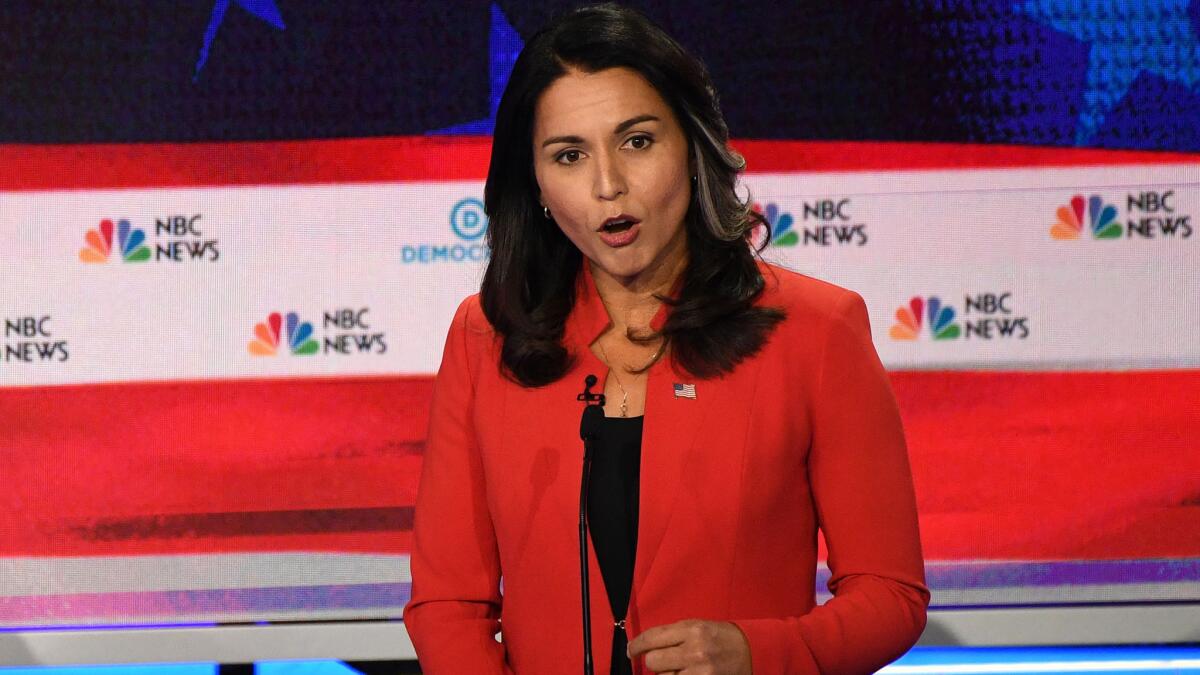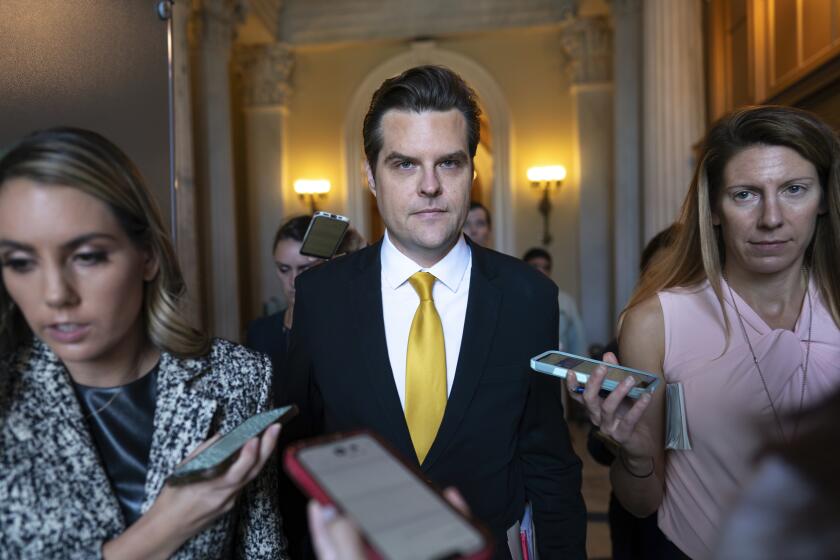Op-Ed: Tulsi Gabbard is why political candidates and the military shouldnât mix

Tulsi Gabbard highlights a problem that is not unique to her. She has two identities, one as a politician and member of Congress and the other as a military officer and major in the Army National Guard. As a Democratic presidential candidate, sheâs blurred and crossed the lines distinguishing those identities.
She should either serve the country in a military uniform or as a national politician, but she shouldnât do both simultaneously, because it harms our militaryâs all-important nonpartisan ethic and has the potential to weaken our national defense by normalizing what could be a dangerous practice.
So either Maj. Gabbard â or Rep. Gabbard â should stand down.
Her ambition to do double duty is noble, impressive, yet nonetheless wrong. And unfortunately, this is a bipartisan affliction. Rep. Adam Kinzingerâs (R-Ill.) service in the Air National Guard is a prominent example on the other side of the aisle. Although the exact figure ebbs and flows, by my count nearly 20 member of Congress were soldier-lawmakers as recently as two years ago.
In this weekâs Democratic debate in Detroit, Gabbard was true to form: Her military service was front and center, as it is in her campaign. Her status as a soldier is the lead biographical bullet point on her Twitter page and her campaign website points out that sheâs âpresently a majorâ in the Army National Guard. The site features a slick video of a political speech she gave in 2014 as a member of Congress, wearing her military dress uniform, deriding the âslashing of benefitsâ for service members and asserting âwe must hold leaders accountable.â
Politicking in uniform clearly violates the spirit of the military officerâs oath â something sheâs done over and over â and should concern every American citizen and soldier.
Because by regulation and tradition, our nationâs military is thoroughly and deliberately nonpartisan as it has a responsibility to prevent politics from splintering our troops and separating the military from society. Military officers are, of course, allowed to have political ideas and to vote privately. But thatâs where it stops because the U.S. military serves all Americans â the red, white and blue â not one party, red or blue.
Although reservists and National Guard troops have slightly different rules that allow for some greater level of political participation than full-time troops, part-time service doesnât mean part-time ethics.
In choosing to run for president, Gabbardâs combined identity as a citizen-soldier sends her into profoundly uncomfortable terrain.
As an oath-bound military officer â with the potential to be called into national service by the sitting commander-in-chief â how can Gabbard answer questions about impeachment appropriately? Could she honestly say to her constituents in Hawaii, and other national supporters, that her answers arenât conditioned on her service as a military officer (which would counsel exercising caution and avoiding calls for impeachment)? Or when sheâs so publicly sold herself as an âoutspoken critic of regime change warsâ could she really tell the soldiers she might lead into combat that sheâs truly willing to salute and support the chain of command, all the way up to the commander-in-chief, and that sheâll fight when necessary?
In military culture, leaders set examples. And Gabbard is setting an example for everyone in military service. Would it be acceptable for others in uniform to similarly broadcast and propagate their personal political views on social media to the same degree as Gabbard? To follow her lead and risk alienating others in their platoon, company, battalion or brigade?
Members of Congress serving in the military undermine the chain of command. Since they canât set aside such a prominent day job (designed to provide direct oversight to the military itself), they are almost certain to receive special treatment. Some majors are more major, but shouldnât be.
For example, Gabbard famously met directly with an avowed adversary of the U.S. government, Bashar Assad, known as the butcher of Syria. How many Army majors would be permitted to do that without facing military justice, let alone be allowed to spell out what their foreign policy would be separate from our governmentâs?
Practicality also intervenes: National political figures will probably never be able to meet the 39 days per year of unit training required for reservists or members of the National Guard, a fact that should exclude them from service. Their job should be given to someone who can put in the time to be ready to fight when duty calls.
Such dual service easily becomes dual exploitation â a national politician advantaged and protected by military camouflage, as well as a military officer advanced and privileged by political clothing.
People are far less likely to tell a soldier-politician like Gabbard, or other simultaneously serving members of Congress, what to do. Thatâs understandable, given the public servantsâ instinctual nobility â we need more citizens like them who want to serve in politics or in uniform.
But one identity should stand down.
Military service is a privilege, sometimes a painful one. It entails the suppression of certain individual interests for the nationâs greater benefit. Whether members of Congress should simultaneously serve as reserve or National Guard officers is a question that should be officially addressed. At a minimum, those who formally seek the office of commander-in-chief should follow the example of Gen. George Washington â and leave military service behind before ascending to political office.
In Detroit, Gabbard promised to bring the âsoldierâs values of service above self to the White House.â Thatâs fine, as long as she leaves the uniform behind well before walking in the front door.
Army Lt. Col. ML Cavanaugh is a part-time professor teaching military strategy at Arizona State University, and co-edited, with Max Brooks and others, âWinning Westeros: How Game of Thrones Explains Modern Military Conflict.â The views expressed here are his own.
More to Read
A cure for the common opinion
Get thought-provoking perspectives with our weekly newsletter.
You may occasionally receive promotional content from the Los Angeles Times.










